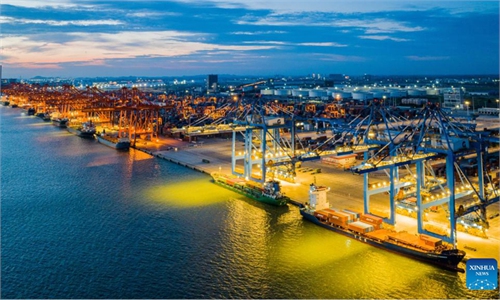Global leaders warn against split in world economy at IFF, commend China’s stabilizing role
Joint efforts needed to tackle challenges; China still an anchor

A worker is busy in a workshop of Harbin Turbine Company Ltd. of Harbin Electric Corporation in Harbin, northeast China's Heilongjiang Province, May 7, 2022. Photo:Xinhua
Leaders from international organizations, executives of major global financial institutions and experts on Sunday called for open and pragmatic cooperation among countries to jointly deal with multiple challenges and put the global economic recovery back on track.
At the International Finance Forum (IFF), which closed on Sunday, they also commended China's experience in maintaining financial stability amid high inflation globally and huge contribution to global economic development.
Geopolitical tensions are making governments pay more attention to strategic competition and national security than their common economic interests brought about by the free flow of commodities, capital and technologies, casting shadows on medium- and long-term global economic growth, Han Seung-soo, chairperson of the Council of Presidents of the UN General Assembly and co-chairman of the IFF, said at the forum held in Guangzhou, South China's Guangdong Province.
Stressing that technological and financial decoupling would bring greater losses for the world, Han urged countries to restart exchanges and dialogue to prevent a worse split and called on global leaders to take more actions conducive to the well-being of the world with a more open attitude, according to the IFF website.
In a speech to the forum, UN Secretary-General Antonio Guterres said that the opportunity for countries to deal with inflating living costs, rising interest rates and the imminent economic recession is slipping away. He called on countries to rebuild trust between developed and emerging market economies, noting that a sustainable, fair and prosperous future is expected with concerted efforts.
The global economy has faced increasing downward pressure amid the prolonged pandemic, growing geopolitical risks, disrupted global industrial and supply chains, soaring inflation and debt problems, among others.
In its latest World Economic Outlook, the IMF downgraded the forecast for global economic growth to 2.7 percent in 2023, the weakest growth profile since 2001 except for the global financial crisis and the acute phase of the COVID-19 pandemic, prompting more countries to focus on economic recovery.
Compared with other major economies, China has achieved relatively fast GDP growth with domestic inflation kept at a low level. Between 2013 and 2021, China's contribution to global economic growth reached 38.6 percent, higher than the US' 20 percent.
IFF Vice President Zhou Hanmin said good harvests and stable energy prices, along with steady economic growth, stable employment and an effective monetary policy, makes the country a ballast stone for the world economy and a main force in solving global industrial and inflation problems.
One aspect of China's experience in maintaining economic resilience against external fluctuations is implementing a stable monetary policy and active fiscal policy for the real economy, said Dong Shaopeng, a senior research fellow at the Chongyang Institute for Financial Studies at Renmin University of China.
"China coordinates the two policies instead of flooding the economy. Therefore, China manages to control the inflation level and achieve a steady economic growth rate," Dong told the Global Times on Sunday.
In the first nine months of 2022, China's inflation rate was only 2 percent, data showed.
China has strengthened its push for dual circulation in accordance with changes in the global situation, while mounting efforts to stimulate the growth of emerging economies in the face of the coronavirus, Dong noted.
He anticipated that China's contribution to the world economy will still be about 30 percent in 2023 and the year after, as global demand will shrink in general, but China will strive to keep a stable trend in overseas trade.
China has experienced many extreme challenges, like many countries, over the past 10 years, such as the coronavirus and the anti-globalization push, but China neither bowed to unilateralism, nor did it give up its rightful interests in the face of hegemony, Chen Jia, an independent research fellow on international strategy, told the Global Times.
"Facts have proved that the model of using hegemony to drive economic growth is a failure. The Group of Seven's increasing stagnation risk and decreasing contribution to the world economy is a good example of this," he noted.
Zhou Xiaochuan, former head of China's central bank, stressed at the forum that the 20th National Congress of the Communist Party of China emphasized that China will continue to promote high-standard opening-up and steadily expand institutional opening-up with regard to rules, regulations, management and standards.
That underscores the country's commitment of opening its door wider and promoting global economic recovery and an open world economy, bringing new opportunities to other countries, Zhou said.



